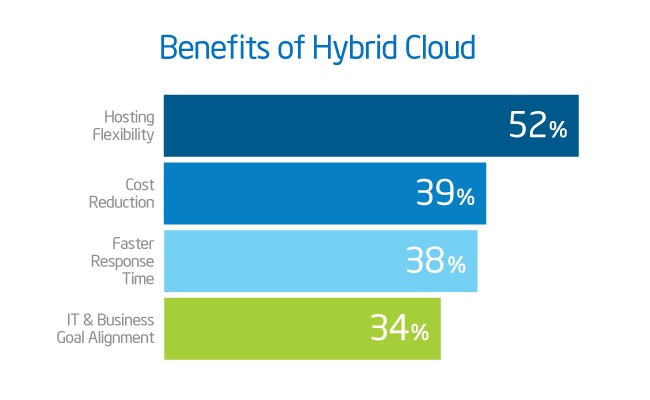Benefits of Hybrid Cloud
In today’s digital landscape, businesses are increasingly adopting hybrid cloud solutions to meet their diverse computing needs. A hybrid cloud combines the advantages of both public and private clouds, offering a flexible and scalable infrastructure that can optimize business operations. In this article, we will explore the numerous benefits of a hybrid cloud and how it can revolutionize your organization.
Enhanced Flexibility and Scalability
One of the key advantages of a hybrid cloud is its ability to provide enhanced flexibility and scalability. By leveraging a combination of public and private cloud resources, businesses can easily scale their infrastructure up or down based on their changing needs. This flexibility allows organizations to handle sudden spikes in demand, ensuring that their services remain uninterrupted and their customers are satisfied.
Cost Efficiency
Implementing a hybrid cloud strategy can significantly reduce costs for businesses. By utilizing public cloud services for non-sensitive data and applications, companies can avoid investing in expensive on-premises infrastructure. This pay-as-you-go model allows businesses to only pay for the resources they use, resulting in cost savings and improved financial efficiency.
Increased Security
Security is a top concern for businesses when considering cloud solutions. A hybrid cloud offers a unique advantage by allowing organizations to keep sensitive data and critical applications on their private cloud while utilizing the public cloud for less sensitive operations. This segregation of resources provides an additional layer of security, reducing the risk of unauthorized access and data breaches.
Improved Reliability
Hybrid cloud solutions offer improved reliability by utilizing redundant infrastructure across multiple cloud environments. In the event of a system failure or outage, businesses can seamlessly switch to an alternative cloud resource, ensuring minimal disruption to their operations. This high availability ensures that critical applications and services remain accessible to users, enhancing overall reliability and customer satisfaction.
Optimized Performance
With a hybrid cloud setup, organizations can optimize their performance by strategically allocating workloads to the most suitable cloud environment. Compute-intensive tasks can be offloaded to the public cloud, taking advantage of its vast resources and scalability. On the other hand, latency-sensitive applications can be hosted on the private cloud, reducing network latency and ensuring optimal performance.
Streamlined Data Management
Managing data across different environments can be a complex task. Hybrid cloud solutions simplify data management by providing a unified platform to handle data across both public and private clouds. This centralized approach enables businesses to efficiently store, access, and analyze their data, leading to improved decision-making and operational efficiency.

As organizations strive for digital transformation, hybrid cloud emerges as a powerful solution that combines the best of both worlds. With its enhanced flexibility, cost efficiency, increased security, improved reliability, optimized performance, and streamlined data management, the hybrid cloud can truly revolutionize the way businesses operate. By adopting a hybrid cloud strategy, your organization can stay ahead of the competition and unlock a world of possibilities.
Frequently Asked Questions – Benefits of Hybrid Cloud
1. What is a hybrid cloud?
A hybrid cloud is a computing environment that combines a private cloud and a public cloud, allowing organizations to leverage the benefits of both.
2. What are the benefits of using a hybrid cloud?
The benefits of using a hybrid cloud include increased flexibility, scalability, cost-efficiency, improved security, and the ability to leverage both public and private cloud resources.
3. How does a hybrid cloud provide flexibility?
A hybrid cloud allows organizations to choose where to host their applications and data, giving them the flexibility to use the most appropriate cloud environment for different workloads.
4. Can a hybrid cloud help with scalability?
Yes, a hybrid cloud enables organizations to easily scale their resources up or down by seamlessly integrating additional public cloud resources when needed.
5. Are there cost savings associated with using a hybrid cloud?
Using a hybrid cloud can lead to cost savings as organizations can optimize their IT infrastructure by utilizing public cloud resources for non-sensitive workloads, reducing the need for on-premises hardware and maintenance costs.
6. How does a hybrid cloud improve security?
A hybrid cloud allows organizations to keep sensitive data and critical workloads on a private cloud while using the public cloud for less sensitive tasks, reducing the exposure of sensitive information to potential security threats.
7. Can I use my existing infrastructure in a hybrid cloud?
Yes, a hybrid cloud allows organizations to integrate their existing infrastructure with public cloud resources, providing a seamless and unified environment.
8. What are the challenges of implementing a hybrid cloud?
Some challenges of implementing a hybrid cloud include data integration, security concerns, and the need for proper management and monitoring of both public and private cloud environments.
9. How can a hybrid cloud help with disaster recovery?
A hybrid cloud provides organizations with the ability to replicate and back up critical Gupta and applications on both private and public clouds, ensuring a more robust disaster recovery strategy.
10. Is a hybrid cloud suitable for all types of businesses?
A hybrid cloud can benefit businesses of all sizes and industries, but the suitability depends on specific requirements, workload characteristics, and security needs.




